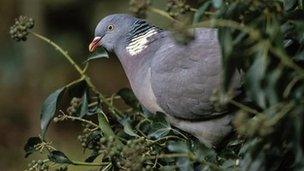Birdwatching takes flight in Britain's prisons
- Published

This weekend over half a million people in the UK will take part in the Royal Society for the Protection of Birds' big garden birdwatch, the largest survey of its kind in the world. Among them are inmates at 61 of the nation's prisons.
The high perimeter fences, stone walls and heavy iron gates of rurally located Kirklevington Grange prison in Cleveland could make you think this is an unlikely place for birdwatching.
As you enter, it has all the sights and sounds you would expect of a prison - gates clanging, the low hum of chatting prisoners, brightly lit corridors and the loud shouts for roll call in the distance.
Aside from the physical and logistical barriers that come with prison life, many of the inmates here are from inner-city areas where birdwatching is not the most common of pastime.
Now, however, the rural setting of Kirklevington and the woodland area surrounding the prison are providing inmates with an opportunity to explore nature, an opportunity which many of them have never had before.
Appreciate life
Two inmates who have become budding bird watchers while at Kirklevington are Danny and Adrian.
"Being able to work with nature and watching birds is a form of escapism from the prison walls," says Danny.
"It's a way to appreciate a form of life that we've not had a chance to before or never took the opportunity to get involved with."
With their birdwatching charts in hand, Danny and Adrian give me an impromptu tutorial on the birds that can be found in the surrounding area.
"We walk around the entire estate of the prison trying to identify these birds," explains Danny. "The built-up area of woodland over there might be good for spotting wood pigeons and the odd blue tit."
Adrian points across the prison's tidy allotments towards the towering metal fence surrounding the gardens.
"You get a lot of the little birds that tend to nest in all the little hedgerows by the side of the prison," he says.
Birdwatching is not confined to rural-based prisons, however. As Gemma Butlin of the RSPB notes: "There's a whole range of prisons taking part, including those in urban areas."
Strong link
Given the inherent freedom of birds and the distinct lack of freedom that prisoners face, this may not seem a likely partnership.
But Adrian and Danny join a list of prisoners throughout history and popular culture that have developed an affinity with bird life.
The Birdman of Alcatraz, loosely based on the story of a real prisoner who adopted injured birds and kept them in his cell, is just one prison-based film in which birds are featured.
Another is the popular Shawshank Redemption, where the elderly inmate Brooks keeps a crow for a companion and the character Red uses the image of an uncaged bird to describe the innocent Andy Dufresne's escape from prison.
And it is not just in Hollywood where this link has been made. References to the feathered creatures have also permeated into the language of everyday prison life - "jailbirds" used as a term for inmates and "doing bird" as slang for time spent inside.
Back in Kirklevington, Adrian recognises that there is a strong link between birds and prison.
"They show you that life goes on outside of prison," he says. "And that you can escape from your thoughts on the inside."
Danny agrees. "From the confines of your cell, the only wildlife you can really see are birds. It's something that prisoners throughout history have taken an interest in."
As well as birdwatching, Kirklevington also runs a number of conservation schemes such as beekeeping and tree planting.
New skills
Some members of the public might think that such programmes are privileges that prisoners shouldn't enjoy.
"The main thing for us is that prison shouldn't be a soft option," argues Sheena Maberly, Head of Learning and Skills at Kirklevington Prison.
"What we are trying to do here is rehabilitate people and help people find a way that works for them. I think a setting like this does help with that, rather than hinder."
Danny and Adrian are confident they have benefited from these schemes and that it will help them develop skills they can use when they eventually leave prison.
"It's therapeutic for us," says Danny. "It serves as an alternative to crime and that sort of lifestyle and gives us a new way of looking at life."
Richard Bashford, project manager at the RSPB, also believes that activities such as birdwatching have a range of positive impacts.
"We want to help people connect with nature as there are clear benefits in terms of health and wellbeing," he says. "From a prisoner's point of view, any added stimulus that nature can provide is a good thing."
According to Kevin Baker, deputy governor at Kirklevington, the returns from these programmes go beyond just the prisoners themselves.
"A lot of our prisoners have young families," he says.
"There would be nothing nicer, on release, for them to be with the youngsters in the local park and to be able to answer the question, 'Daddy, what type of bird is that?'"